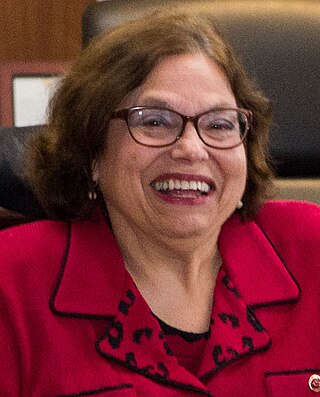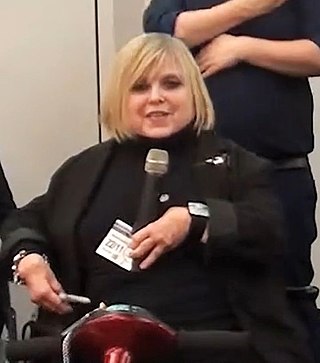Alan Holdsworth is a British musician and disability activist living in Philadelphia, United States.
The disability rights movement is a global social movement that seeks to secure equal opportunities and equal rights for all people with disabilities.

Edward Verne Roberts was an American activist. He was the first wheelchair user to attend the University of California, Berkeley. He was a pioneering leader of the disability rights movement.

The ITV Telethons were three charity telethons organised and televised in the United Kingdom by the ITV network. They took place in 1988, 1990 and 1992. Each lasted for 27 hours and all were hosted by Michael Aspel.

Judith Ellen "Judy" Heumann was an American disability rights activist, known as the "Mother of the Disability Rights Movement". She was recognized internationally as a leader in the disability community. Heumann was a lifelong civil rights advocate for people with disabilities. Her work with governments and non-governmental organizations (NGOs), nonprofits, and various other disability interest groups significantly contributed to the development of human rights legislation and policies benefiting children and adults with disabilities. Through her work in the World Bank and the State Department, Heumann led the mainstreaming of disability rights into international development. Her contributions extended the international reach of the independent living movement.

Disabled In Action of Metropolitan New York (DIA) is a civil rights organization, based in New York City, committed to ending discrimination against people with disabilities through litigation and demonstrations. It was founded in 1970 by Judith E. Heumann and her friends Denise McQuade, Bobbi Linn, Frieda Tankas, Fred Francis, Pat Figueroa, possibly Larry Weissberger, Susan Marcus, Jimmy Lynch and Roni Stier (all of whom were disabled). Heumann had met some of the others at Camp Jened, a camp for children with disabilities. Disabled In Action is a democratic, not-for-profit, tax-exempt, membership organization. Disabled In Action consists primarily of and is directed by people with disabilities.

Harriet McBryde Johnson was an American author, attorney, and disability rights activist. She was disabled due to a neuromuscular disease and used a motorized wheelchair.
The depiction of disability in the media plays a major role in molding the public perception of disability. Perceptions portrayed in the media directly influence the way people with disabilities are treated in current society. "[Media platforms] have been cited as a key site for the reinforcement of negative images and ideas in regard to people with disabilities."
Paul K. Longmore was a professor of history, an author, and a notable disability activist who taught at San Francisco State University.
Laura Ann Hershey was a poet, journalist, popular speaker, feminist, and a disability rights activist and consultant. Known to have parked her wheelchair in front of buses, Hershey was one of the leaders of a protest against the paternalistic attitudes and images of people with disabilities inherent to Jerry Lewis's MDA Telethon. She was a regular columnist for the Christopher and Dana Reeve Foundation, and on her own website, Crip Commentary, and was published in a variety of magazines and websites. She was admired for her wit, her ability to structure strong arguments in the service of justice, and her spirited refusal to let social responses to her spinal muscular atrophy define the parameters of her life as anything less than a full human existence. She was also the mother of an adopted daughter.
Lives Worth Living is a 2011 documentary film directed by Eric Neudel and produced by Alison Gilkey, and broadcast by PBS through ITVS, as part of the Independent Lens series. The film is the first television chronicle of the history of the American disability rights movement from the post-World War II era until the passage of the Americans with Disabilities Act (ADA) in 1990.
Disability art or disability arts is any art, theatre, fine arts, film, writing, music or club that takes disability as its theme or whose context relates to disability.

The Disability Rag was a periodical published between 1980 and 2004 as a subscription-based print publication, and as an online publication from 1997 to 2007. In addition to covering the U. S. disability rights movement, The Rag, as it was usually called, published a wide range of articles and opinion pieces from individuals with disabilities. It was considered one of the most important publications of the disability rights movement. The not-for-profit Advocado Press was incorporated in 1981 to serve as publisher of The Rag. The Advocado Press also published a number of books and monographs on disability issues.
The Disabled People's Direct Action Network (DAN) is a disability rights activist organisation in England and Wales that campaigned for civil rights with high-profile street demonstrations involving civil disobedience, rallies and protests.
Ian Stanton (1950-1998) was a singer-songwriter and disability rights activist known for his ironic lyrics about the civil rights struggle of disabled people. He performed his music across the UK and internationally; as well as being an actor on stage and national TV. He worked at the Greater Manchester Coalition of Disabled People as the editor of the Coalition magazine.
The Greater Manchester Coalition of Disabled People (GMCDP) was established in 1985, a membership organisation in the UK that is controlled by disabled people. GMCDP is regarded as being influential in the social, cultural, economic, and legal policy debates on a national stage that have impacted on disabled people, grounded in the Social Model of Disability. The GMCDP magazine Coalition was referred to in these debates, its articles being cited in academic textbooks as well as within the community. The history of GMCDP has been a microcosm of the history of the radical disabled people's movement in the UK since the 1980s, with GMCDP members often involved centrally and nationally.
The National Disability Arts Collection and Archive (NDACA) is a British collection focusing on Disability Arts which opened in 2019. It consists of an online collection and a facility at the High Wycombe campus of Buckinghamshire New University, and features over 3500 objects. The project is funded by the National Lottery Heritage Fund, and is led by Shape Arts, with David Hevey as the project's creative director, and founded by Tony Heaton.
Rights Now, sometimes written with an exclamation mark, was a British umbrella group of disabled people's organisations and charities which campaigned for a change in the law to prevent discrimination against disabled people and for a full civil rights law, even though the result was the flawed Disability Discrimination Act 1995. The biggest protest in numbers of people was in July 1994 at Trafalgar Square and Whitehall, London. It was a very broad-based campaign, including trade unions for example. Campaigning to improve the laws for full civil rights continued, but Rights Now as a group ended in 1995.
Then Barbara Met Alan is a 2022 British television drama film about Barbara Lisicki and Alan Holdsworth, the founders of DAN, a disability activism group. It is written by Jack Thorne and Genevieve Barr and stars Ruth Madeley and Arthur Hughes. It broadcast on BBC Two on 21 March 2022.

Barbara Lisicki is a British disability rights activist, comedian, and equality trainer. She is a founder of the Disabled People's Direct Action Network (DAN), an organization that engaged in nonviolent civil disobedience to raise awareness and to advocate for the rights of disabled people. She is a featured subject of the 2022 BBC docudrama Then Barbara Met Alan, and appeared in The Disabled Century on BBC2 in 1999.






